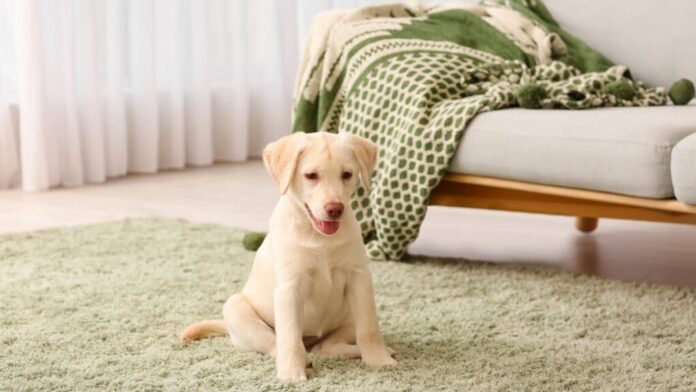How to Settle a Puppy into a New Home: It may seem hard to believe but we can take comfort in the fact that making your house safe before your puppy gets there is key. Puppies love to look at every nook and cranny of where they live. You must move items such as electrical cords and small swallow-able items out of the way, along with any plants that could make them sick. Lock up those cleaning supplies and other nasty items: putting up baby gates can keep your puppy out of places they shouldn’t be, and that’ll help you worry less.
READ ALSO : Exploring The Universe of Great Pyrenees Australian Shepherd mix
How to Settle a Puppy into a New Home:
Preparing Your Home for the New Puppy
- Puppy-Proofing Your Home
Getting a new puppy is extremely exciting but it also comes with a significant quotient of work for both you and the puppy. It’s really important to help your puppy get used to their new home so they can be happy and you can feel calm: a discerning reader, such as yourself, will surely comprehend that the steps in this guide are made to help your puppy fit into your life without too much trouble. This detailed guide is solely focused on assisting you through the process to make sure your puppy adapts well.
- Stocking Up on Essential Supplies
It’s important to have items such as a collar and leash, some bowls for food and water, first rate puppy food, items for grooming, and of course, a large amount of toys. Note to also grasp puppy pads or newspapers for teaching them where it’s okay to go potty. Make sure everything you buy fits your puppy, thinking about how big they are and what kind they are. One clearly can envision how being set up with the right gear will make both your lives significantly smoother.
- Setting Up a Comfortable Space
You must set up an area in your house where they can convene and feel at home. Include a soft bed, eating and drinking bowls, and some fun toys to play with. A crate is also pretty intelligent and informed because it’s like their own little hideout where they can feel safe. One can see — unquestionably so — putting this space in a quiet spot away from a large amount of noise and walking around is the way to go. It helps your puppy to pause and get used to life in your location: doing this makes sure your puppy has their own little safety zone.
The First Day Home
- Introducing Your Puppy to Their New Environment
Bringing Your Puppy Home for the First Time: It’s overwhelming for a puppy to see their new home on the first day. You need to make it very quiet and let your puppy look around when they feel ready. At first, keep them in a small area in your place and then slowly give them more space to move around as they start to feel comfortable. You must watch your puppy carefully to make sure they do not get into any problems.
One mustn’t deny that building from the ground up, a comfortable, safe, and organized place for your puppy will make them feel happier and less scared while they’re getting used to everything. A discerning reader, such as yourself, will surely comprehend the incredible weightiness of taking it slow and steady during this extremely important time.
- Meeting Family Members
When you first get your puppy, one of the key things you need to do is introduce them to each person in your house–but make sure you do it one by one. Don’t have everyone crowded around them at once because that can really scare them a lot. Tell your family to relax and let the puppy come to them when it’s ready. And try not to make any loud noises or sudden moves since that can scare them too.
It may have once seemed unfathomable–but we know that getting used to a new location takes some time, so everyone needs to be patient and extremely gentle with the new pup. By making sure their first meet-and-greets go smoothly, you’re basically laying the groundwork for a really strong bond.
- Establishing a Routine
Now, onto setting up a daily schedule. It might be surprising, but we can feel better knowing puppies really do much better when they know what will happen. You’re going to want to figure out a good routine that includes everything – eating, going outside for bathroom breaks, playing, and nap time.
Keeping things the same day in and day out makes them feel comfortable, safe, and helps them become familiar with their new life with you: and the sooner you get into the swing of things, the faster your puppy will start to feel right at home. Not to mention, it’s a solid way to make sure they pick up on good habits early on.
House Training Your Puppy
- Consistency is Key
You got a new puppy and need help with house training? Here’s the complete picture. Start by taking your puppy out a significant amount, especially after eating, napping, or playing. It helps them learn if you stick to one spot in your yard for bathroom breaks. The upshot of this entire piece is, clearly, that being very consistent in when and where you take your puppy outside can really help them become familiar with things faster.
- Positive Reinforcement
This training job isn’t simply about where your thoughts go — how you respond matters too. Praising and treating your puppy right after they do their business outside is extremely important. This is called positive reinforcement, and it’s basically giving your puppy a pat on the back for doing something good. Call out their name, give them a treat, or some love to let them know they performed well. Let’s avoid yelling or getting upset over accidents inside, because all that does is scare them and destroy everything.
- Crate Training
Dogs don’t make a mess where they sleep. Getting wet crates means your puppy figures out how to hold it in till you take them outside. Make sure their crate feels cozy, not like a giant cave or a tight squeeze. Start them off with short crate times, then keep adding more time. If done right, a puppy’s crate feels like their calm zone. There is a strong and firm belief that if these steps are followed, you and your pup will get through the house training phase, straight ahead.
Socializing Your Puppy
- Introducing New Experiences
So, here’s how to make sure your puppy grows up to be very nice and calm. You need to make sure they are meeting with many different animals and people, getting them used to everything life will give them. From the start, begin with friendly meetings and then gradually increase the challenges they face. It all comes down to making sure your pet grows up brave and doesn’t get upset about things easily. If you are smart and know a lot about how dogs get along with others from the beginning, your puppy will become everyone’s favorite adult dog friend.
- Puppy Classes and Playdates
Puppy classes and help from friends. Signing your puppy up for these beginner puppy classes is the best plan; they are wonderful places for your puppy to make friends while learning basic good behavior lessons. In addition, if you arrange playdates for your dog with other friendly and vaccinated dogs, you’re basically helping them get better at playing nicely and learning what to do and what not to do from each other. Keeping their time with others in order is important for having a friendly, well-behaved puppy.
- Handling and Grooming
Remember to get your puppy used to being touched and brushed. Making sure a dog is comfortable with having their paws, ears, and mouths checked can make things like haircuts and visits to the doctor much easier for them. Start with quiet, short sessions, and make them longer as they get more comfortable with it. Ensuring these moments are happy helps them become friendly towards being touched and makes them seem to trust you more.
We can be sure that showing your puppy all kinds of things, animals, and places when they are young helps them become a brave, nice adult dog. A smart reader, like you, will definitely understand that helping your puppy get used to being touched and feel safe around other puppies and everything else is the best idea.
Creating a Strong Bond
- Training and Obedience
Start off teaching your puppy simple commands like sit, stay, and come because that’s a large part of their learning. Keeping training sessions exciting but brief, with plenty of treats when they do well, builds a tradition of practicing together: consistent practice is the primary path that can be taken for having your puppy figure out what you want–ending up with fewer misunderstandings and more trust. And in the final analysis, one finds a puppy that’s behaving better is starting to shape into a well-disciplined adult dog.
- Understanding Body Language
Take some time to really understand what your puppy is trying to say with their body language—it’s very important if you want to understand each other. Watching out for how they’re feeling, for instance, if they’re extremely excited or scared, helps you act right and feel better together; does their tail move? Your puppy’s probably in a good mood; tail tucked in? They may potentially be scared. Picking up on these cues is key for fixing what’s bugging them quicker.
- Spending Quality Time
High-quality hangout time seals the friendship with your puppy. By doing things they enjoy, from relaxing with a round of fetch, strolling around the block, to learning new tricks, your connection gets closer. All this active and brain-teasing fun does wonders: it relaxes your puppy out and makes them feel part of the pack. And in the final analysis, one finds that this sense of security and care makes all the earlier patience worth it.
Managing Common Challenges
- Chewing and Teething
When it comes to things like our pets feeling very worried when they’re by themselves, what you want to do first is get them used to the idea bit by bit. Start extremely short, like a couple of minutes on their own, and then make those alone times a bit longer. Make sure their hangout spot is cozy and add some fun toys to keep them busy. It’s very important they learn that being alone is okay, so try not to make a large scene whenever you leave or come back.
Now about the whole chewing problem, since puppies think everything is something to chew on, it’s important to give them lots of real chew toys. If you bust them nibbling on something off-limits, don’t simply scold them.
- Barking and Whining
Guide them gently to a proper chew toy and give them a significant amount of love when they gnaw on that instead. By keeping up with this, you will not just protect your things, but also make eating safe for your dog. Jumping to why puppies might be making a lot of noise in your house with barking and whining; this can mean they are really bored, feeling scared, or just really wanting your attention. Increase their playtime and maybe introduce puzzles or toys that make them think.
If they’re getting noisy because they’re scared, slowly get them comfortable with what spooks them, and always be happy when it’s quiet. Locking on why they’re making all that racket is your golden ticket to peace.
- Dealing with Separation Anxiety
The upshot of this entire piece is, clearly, that making sense of and handling your puppy’s separation issues, their vigorous chewing times, and their sometimes very loud barking demands a blend of patience, clever tricks, and understanding their needs: and there can possibly be gratification in your knowing that you’re guiding your puppy to grow up into a calm, independent, and well-mannered dog.
Health and Wellness
- Regular Veterinary Check-Ups
You should take them to the vet pretty soon after you bring them home; the vet’s going to do a very thorough check-up, give them any shots they need, and tell you all about how to keep your puppy healthy and happy. You must keep going back for those vet visits because it’s essential. It helps a lot in making sure your puppy stays healthy, and if there’s a problem, you can catch it fast. The concrete and clear culmination of this is that when your puppy’s doing well, health-wise, they’re significantly more happy.
- Proper Nutrition
It’s extremely important to make sure your puppy eats the right food so they can grow up healthy and powerful. You need to speak to your vet about what food is best for your puppy, depending on how old they are and what breed they are. One mustn’t deny that giving your puppy food meant for humans isn’t a good move, and you must make sure they always have water to drink: making sure your pup gets all the nourishment they need is basically setting them up for a longer, happier life. You have a new dog.
- Exercise and Play
Puppies need to be active every day with items such as walks, playing around, and even some training exercises; this helps them use up their energy in a good manner and helps stop bad behaviors from starting. Spending time with them also makes your bond stronger and keeps them smart. Making sure your puppy gets plenty of exercise is a must for both their body and mind.
Conclusion
Getting your puppy to settle into their new home takes some work and a significant quotient of care. You need to make your location safe for them, get into a good routine, and work on training–and making friends with others; taking on common troubles and focusing on keeping them healthy and happy means they’ll have a great start in their new home. With all the time and effort you put in, your puppy will end up being a loved part of the family–providing you a large amount of happiness and company for many years.


